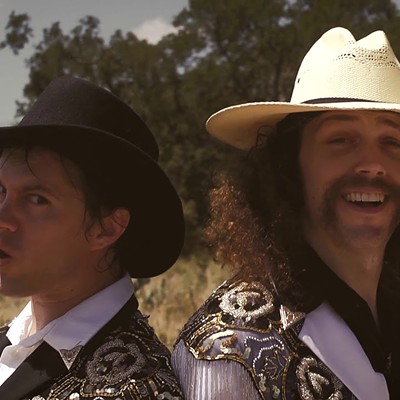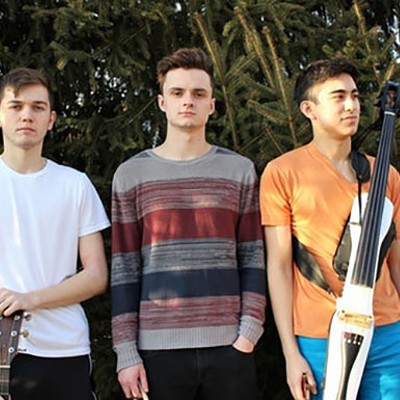When Corin Tucker, singer and guitarist of Portland's Sleater-Kinney, sang "It's time for a new rock 'n' roll age" on 2000's All Hands on the Bad One, she had in mind something along the lines of more women being accepted into the rock 'n' roll world. But Sleater-Kinney's new album, One Beat (Kill Rock Stars), is a chronicle of a year spent in that new age, and it has more to do with dealing with the fact that the country is engaged in war and less with gender politics.
Sleater-Kinney's brand of punk rock has always been voluptuous and beautiful, dealing with their subject matter from the inside out; it's less battle cry and more war narrative. One Beat progresses through the grieving cycle: the initial shock, the anger, the frustration, the questioning and the getting on with life. The record opens with drummer Janet Weiss banging out a call-to-arms march and Corin Tucker's dramatic voice lamenting "Now all that's on the surface are bloody arms and oil fields." The next song, "Far Away," is Tucker's personal story of where she was September 11 ("7:30 a.m. nurse the baby on the couch and then the phone rings"). It's the first reaction, the beginning of the story. "Oh God I love my dirty Uncle Sam," Tucker sings in "Combat Rock," and then asks, "Where is the questioning; where is the protest song?" The protest songs are here: In "Step Aside," Tucker reminds us "When violence rules the world outside/And the headlines make me want to cry/It's not the time to just keep quiet."
Sleater-Kinney began in the mid-1990s, riding in on the heels of Bikini Kill and other Northwestern riot grrls with guitars. But Sleater-Kinney was always better than their peers; they could play their instruments better, they wrote songs that were listenable. They could create a full, layered sound with just two guitars and drums. Their focus is less on the message, more on the music, so the message, in turn, is emphasized by the music. What makes One Beat a great album is this indirect focus; the best songs on the album have nothing to do with September 11, except that they provide contrast, making the few songs that are protest songs more powerful.
"It wasn't a conscious decision to tackle that subject for the album, necessarily, it was just more a matter of, you know, the really prevalent thing that we were dealing with when we were writing the album and just the thing that was weighing heavily on our minds," said Tucker over the phone from her home in Portland.
"I found it really discouraging that the way that so many people dealt with their anxiety and fear and grief about the situation was to go out and buy a big flag and post it on their car," said Tucker. "People's feelings got pushed into this intensely nationalist movement and there was a real frowning upon of discussion and debate about how we should deal with the terrorist attacks, and that was a really frightening thing to see. So that's where the inspiration for 'Combat Rock' came in, because we felt really worried about what direction the country is and was going in, especially last winter. Frightening."
The band took some time off after All Hands on the Bad One so that Tucker could take care of her new baby; drummer Janet Weiss could spend time with her other band Quasi; and guitarist Carrie Brownstein could pursue an acting career (she plays a hypochondriac in Group, an independent film about an all-women therapy group made in Olympia). Also in that time, Brownstein moved from Olympia to Portland, where Tucker and Weiss live.
"I think especially taking a couple years off gave us sort of a fresh perspective and let us sort of refocus on the music that we wanted to make together," said Tucker. "It's definitely been easier now that we're all living in the same city and we're able to write everyday and write in a more relaxed setting rather than having to commute to write a song."
Sleater-Kinney started off pigeonholed as a girl-punk band but since then, they have moved beyond that label, while still maintaining a feminist stance. Even though the riot girl movement seems to have taken the back burner in music, it may be because it's been somewhat successful; there are many girls playing rock and roll these days. Said Tucker, "I think that people are still doing feminist work and sort of thinking of that ideology but it's just sort of transformed into different mediums."
Sleater-Kinney plays concerts like Lady Fest in Olympia whenever they get the chance, said Tucker. They've even had a hand in influencing the next generation, playing a benefit for the Rock 'n' Roll Camp for Girls, a non-profit summer day camp in Portland.
"All of us got to teach workshops at that camp. I taught songwriting and Carrie taught guitar and Janet taught drums," said Tucker. "Sarah Dougher [of Cadallaca, of which Tucker is also a member] and I taught a songwriting workshop and we just started with the basics of what makes most traditional rock songs and broke it into parts, like verse and chorus, and just gave the girls the basic tools and language for songwriting. We thought that maybe that was all we were going to accomplish but we actually got them to break down into small groups and write a song in class and then perform. It was really amazing. These girls were just totally self-confident and just ready to go."
It's that kind of confidence that fuels One Beat: Tucker is singing her mind and ready to go. "If you hate this time/ Remember we are the time" she sings on "Combat Rock," and when she asks "Could you invent a world for me?" on the title track all the possibilities become apparent, both good and bad.
Sleater-Kinney are expanding the universe of great rock songs. "If I'm to run the future you've got to let the old world go," sings Tucker on the title track; over and over again on One Beat, Sleater-Kinney seem to be saying that you just have to keep rocking and rolling, even when commercial airline jets smash into the tallest buildings, so the volume on the protest songs can be turned up loud enough so everyone can hear.











